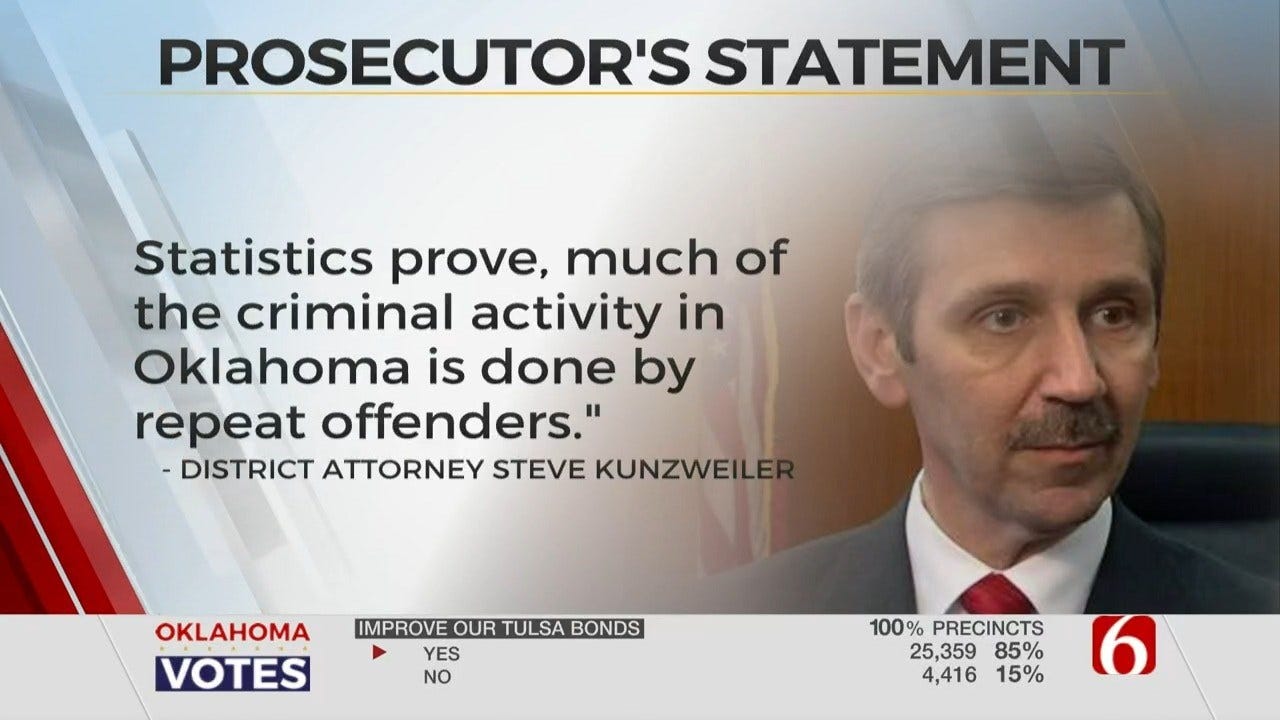Tulsa Co. DA Steve Kunzweiler Responds To Push For More Prison Release
Tulsa County District Attorney Steve Kunzweiler is responding to a group's push to release more prisoners from Oklahoma's correctional facilities.Tuesday, November 12th 2019, 8:31 pm
Tulsa County District Attorney Steve Kunzweiler is responding to a group's push to release more prisoners from Oklahoma's correctional facilities.
Oklahomans for Sentencing Reform filed a ballot initiative with the Secretary of State's Office. It's the same group that was behind the 2016 ballot initiative, which led to hundreds of prisoners being released last week.
Now, they want to prevent prosecutors from using previous felony convictions to enhance sentences for nonviolent cases. It would also allow people who already had a sentence enhancement to petition the courts for relief.
"I have grave concerns that the authors of this initiative proposal have not done their due diligence in evaluating the ramifications of their ideas," Kunzweiler said in a statement. "We should not be rewarding bad conduct, and this is a troubling proposition."
Statistics prove repeat offenders commit much of the criminal activity in Oklahoma.
Kunzweiler released the following statement:
Currently, there are two Commissions created by the Oklahoma Legislature and approved by two Governors of this State to examine issues related to the criminal justice system. The Oklahoma Criminal Justice Reclassification Coordinating Council and the Criminal Justice Reentry, Supervision, Treatment and Opportunity Reform (RESTORE) Task Force have met extensively over the past year with individuals who are on the front lines of criminal justice. These commissions include members of the business community, victim advocacy groups, law enforcement officials, corrections officials, defense attorneys, prosecutors, mental health professionals, court officials and legislative leaders. I am privileged to be an appointed member to both commissions. Ultimately, the purpose of these commissions is to assist our elected legislative and executive office officials by insuring public safety while encouraging the meaningful rehabilitation of individuals who have entered the criminal justice system. Our state needs a cohesive and comprehensive review of criminal justice practices and outcomes – it does not need a piecemeal approach which runs counter to the longstanding efforts which have been underway. As I have said before, let us do the job we were commissioned to do.
To my knowledge, the initiative proposal was not brought before either of these statewide commissions. From the outset, I encouraged those individuals and organizations who desire change to bring their ideas to the table. It would be helpful to the citizens of this state to have radical proposals like this thoroughly vetted by the commissions our legislative leaders created. I have grave concerns that the authors of this initiative proposal have not done their due diligence in evaluating the ramifications of their idea(s). Take for example the premise that no repeat burglar should be treated as a repeat burglar under the initiative proposal. Any person whose home has been ransacked, or whose automobile has been pillaged in their driveway, would likely consider the perpetrator as a threat to their family and community. Likewise, there are many crimes which are not listed as “violent” crimes under the authors’ proposal which by their very nature are inherently violent: domestic abuse by strangulation; child sex trafficking; cruelty to animals; aggravated assault and battery; feloniously pointing a firearm; and soliciting sex from a minor to name just a few. We should not be rewarding bad conduct and this is a troubling proposition.
Without this state question, we have already made significant movement on reducing incarceration in Oklahoma. Today there are roughly 1,200 fewer inmates than when Governor Stitt took office. Instead of trying to ignore past convictions of repeat offenders, we need to be investing in services so people do not become repeat offenders. Statistics prove, much of the criminal activity in Oklahoma is done by repeat offenders. To say we are going to ignore that past history as we protect the public is foolish.
Oklahoma’s District Attorneys have worked hard to create and grow many alternatives to incarceration programs. These are programs which promote accountability and incentivize meaningful rehabilitation. Unfortunately, similar initiative proposals like this have had a negative impact on enrollment and participation.
More Like This
November 12th, 2019
January 2nd, 2025
September 29th, 2024
Top Headlines
April 21st, 2025









